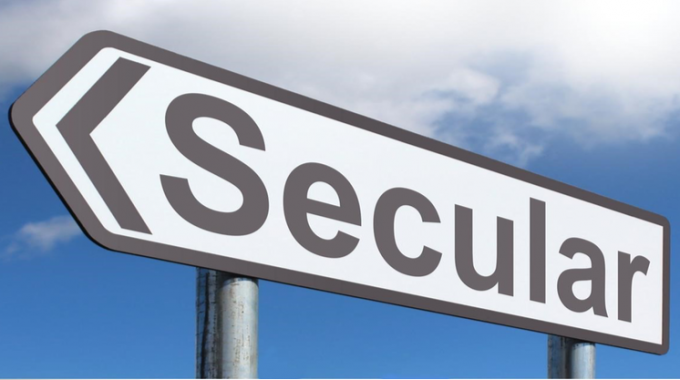
Welcome to the “SMR Society” (Part I)
An article from Evert van de Poll for Vista Magazine.
Secular and Multi-Religious
Over the last few decades, we have been witnessing the persistence and even the resurgence of religious beliefs and practices in societies that had undergone a long process of secularisation.
This seems to run contrary to classic secularisation theory according to which the secularisation of society and the decline of the Church in Europe were the unavoidable corollary of modernisation and hence an irreversible process, not only in Europe but also in other parts of the world.
Some authors speak of a ‘post- secular’ society. But this is not to say that secularisation is coming to an end. Surely, the overall decline of Church membership, the influence of secularism in science and politics, the spread of secular lifestyles, the move away from traditional Christian morals, anticlerical sentiments and opposition to the influence of religion in society, all continues. But at the same time there are contrasting developments: practising and committed Christians remain an important and influential minority, and their percentage is even growing in some countries. New forms of Christianity are developing, largely but not only due to immigration. Muslim and other religious communities are developing. Demographic trends are clearly in favour of the religious population, as Jim Memory brings out in his article (Demography is destiny – here and here).
Then there is the so-called ‘return of religion’ in the public sphere, i.e. in civil society, in the arts, in popular music, in philosophical debates, as well as social media and the Internet. Muslims, but also Jews and Christians, are marking their differences, for everyone else to see.
At the same time, the number of ‘nones’ (non-religious or unaffiliated) is increasing, but among them there is a widespread interest in spirituality, and an attachment to social values rooted in Christianity.
No return but ‘SMR’
So, religion continues to be important in the secularised societies of Europe. We should not think of (or dream of) a return to a former situation in which Christianity was the dominant religion, and the only one in many places. The near future is one in which religious and non- religious will live side by side. Both are here to stay, so they have to work together in society. The present situation is characterized by a plurality of worldviews, and by the renegotiation of the place of religion in the public sphere. Moreover, Christians have to accept that they are a minority among other religious minorities. Welcome to the SMR society: secularised (or secularising) and multireligious at the same time.
Granted, the label ‘SMR’ is my own suggestion, for want of a better one. In fact, there is not yet a widely agreed concept to denote the situation summarised above. A range of theories have been developed to analyse it. Different terms are proposed, depending on what aspect or what implication one is concentrating on. Let us mention some of them.
Post-secular intellectual dialogue
Several authors use the term ‘post- secular’. German philosopher Jürgen Habermas is widely credited for having popularized it.1 What did he mean by that? He says that he has always written as a ‘methodological atheist’, which means that when doing philosophy or social science, he presumed nothing in advance about particular religious beliefs. Yet in the light of the continuing role of religion in society, he evolved to a ‘post-secular’ stance, meaning that fundamental questions in society cannot be reduced to merely secular rational ideas and theories.
Religious people have important things to say about scientific, ethical and political issues – let alone questions that transcend the visible and the tangible. They also are rational, the basic difference from secularism being that they take into account the influence of a transcendent reality. Habermas takes issue with all forms of militant secularism that consider secular science and humanism to be the only relevant discourse in the public realm. Religious convictions, values and norms should not be ruled out from the public debate, just because they are not based solely on human reason and science. So there should be an intellectual dialogue between believers and non-believers. Former pope Benedict XVI accepted the challenge and undertook a series of in-depth conversations with Habermas on the foundational values of modern society. The publication of this dialogue (The Dialectics of Secularization, 2007) has exerted considerable influence.
Any dialogue can only be fruitful when no party imposes his or her own language on the discussion. This is particularly difficult for secularists to admit, since they are used to putting everything that refers to the transcendent within the brackets of ‘private persuasion’, so as to conveniently ignore what the other is saying. In his own dialogue with Joseph Ratzinger, Habermas makes some important points:
‘Persons who are neither willing nor able to divide their moral convictions and their vocabulary into profane and religious strands must be permitted to take part in political will formation even if they use religious language… The democratic state must not preemptively reduce the polyphonic complexity of the diverse public voices, because it cannot know whether it is not otherwise cutting society off from scarce resources for the generation of meanings and the shaping of identities. Particularly with regard to vulnerable social relations, religious traditions possess the power to convincingly articulate moral sensitivities and solidaristic intuitions.’ This is what Pieter Boersema calls a ‘pluralistic dialogue’, in which people try to get beyond stereotypical images of the other and towards a deeper understanding of their motivations and the meaning of their viewpoints.
(Part II here)
Evert Van de Poll
Professor of Religious Studies and Missiology, European Theological Faculty, Leuven, Belgium

This Post Has 0 Comments